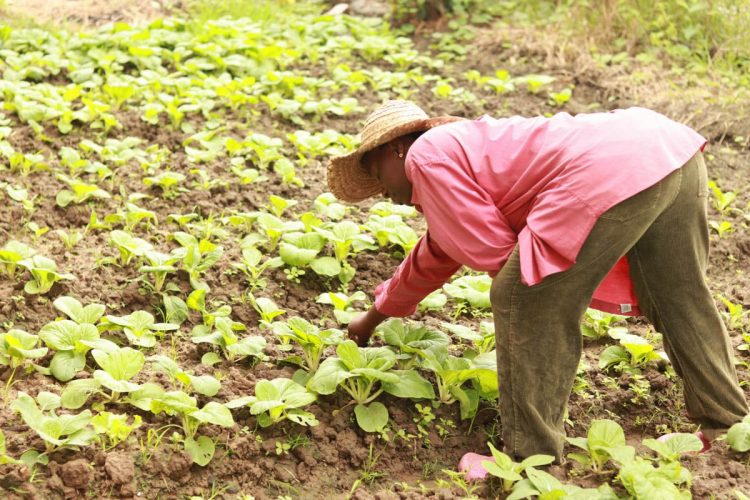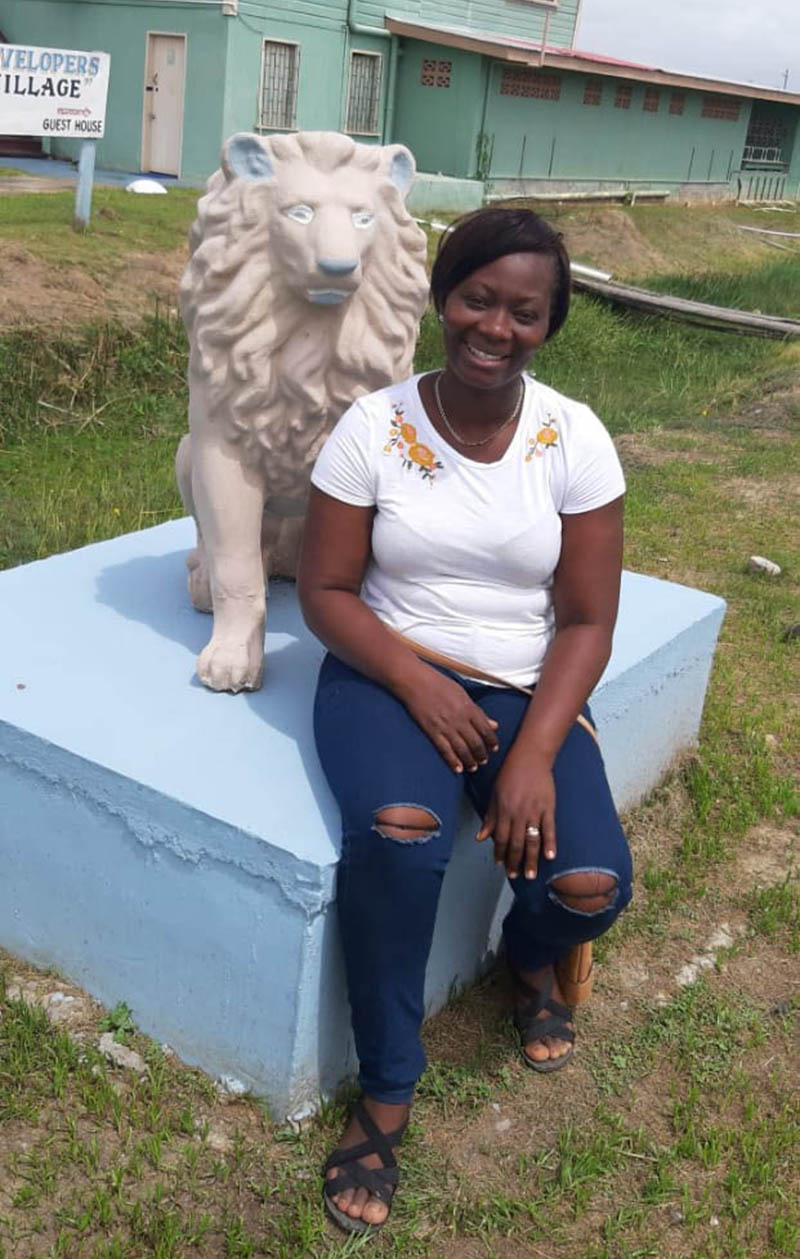Historically, the agriculture sector has been male-dominated. While, historically, women have been known to work side by side with men in the sugar industry and to develop and sustain ‘kitchen gardens’ to keep the family pot ‘boiling, men, apart from being dominant on large farms across the sector have been known to dominate various other disciplines associated with food production. On the whole, the role of women in agriculture in contemporary Guyanese society has been long under-acknowledged. That notwithstanding, the work of Andrea Seechun as a farmer and, beyond that, as a source of knowledge about the agriculture sector has caught the attention of the Stabroek. In this issue the of the Stabroek Business the first in our series titled Women at Work focuses on Sndrea and her work in the agriculture sector.

Although not adequately acknowledged, women have been making an invaluable contribution to the agriculture sector. Beyond conventional ‘kitchen gardens’ women have been journeying to the backlands, with or without their spouses to prepare lands, plant, and harvest crops. Additionally, they dominate the agro-processing sub-sector, turning fruit and vegetables into products that stand on their own on both local and international markets. While some of women’s contributions to agriculture have been documented in some sections of the media, there is still a long way to go before women are recognized for their contribution to the sector.
In this the first of our Women in The Agriculture Sector series of interviews the Stabroek Business sits down with Andrea, who lives and works in Region Six to discuss aspects of her experience as a farmer
SN: Lets talk about how it all started. Did your upbringing have anything to do with your becoming a farmer?
AS: When I was young, about 8 years old, my family would take long trips to the Canji Creek where my Stepfather had a farm. We would plant ground provision. This would happen during the holiday period until I was around 16. This is where my love for farming started. Actually, I started off hating it because it was hard. The journey to the farm was long, but we were doing it every day and the end process was rewarding. I grew to like it. Eventually it became a ‘fun process.’
SN: Some women would regard farming as physically demanding, dirty work. Most of them would probably seek out ‘softer’ jobs. You have been a farmer for many years. What is it that has kept you there?
AS: As the saying goes “choose a job you love, and you’ll never have to work a day in your life.” That is how I feel about my job. I have a passion for what I do; that keeps me going. People may see farming as ‘dirty work.’ Farming feeds us. Our work ensures that the world is fed. Apart from that I enjoy looking at plants in their various stages of growth. I begin my day by going to my Kitchen Garden. I am hurting right now because I can’t plant anything in my garden. I tried twice, recently. The rains washed away everything. I am just waiting for the rainy season to pass so I can plant again.
SN: You have even managed to raise a family whilst remaining a farmer. Is there a secret to pursuing these two demanding pursuits at the same time?
AS: It is challenging, but planning is important, especially when you have two demanding pursuits. I am an early riser. I’m usually out of bed by 3 am to get my household chores done. After that I head to the farm before the heat of the day kicks in. Once it gets too hot I head back to the house to continue the household chores and see to my children’s concerns. One of them completed secondary school about two years ago. The other two are still in school. They are all old enough to help themselves now, so the job has become easier. When they were babies, I would strap them to my back and have them there while I work. Its all pretty demanding, but I love what I do. That helps me to balance things.
SN: Farming is a great deal more than sowing seeds sand reaping produce. What do you consider to be the secrets to being a successful farmer?
AS: I enjoy the financial rewards but I am also passionate about the entire process. The best part of the job is the knowledge that you are producing good, healthy food. I look forward to the reviews of the people who eat what I grow.
SN: I am aware that apart from cultivating your own produce you also market what you grow? Are the two pursuits separate parts of the same overall exercise or are they two separate pursuits that demand different kinds of skills?
AS: I prefer planting and watching plants grow. I also enjoy going to market and attending expos. Marketing can be demanding sometimes. However, I enjoy interacting with customers and receiving feedback on the things that I market.
SN: I’d like to know more about your marketing methods. Are there middle men involved in the process or do you sell directly to the consumer?
AS: I prefer to take my produce to the market myself. That way, my profits are higher. There are times, however, when I work with middle men. That sometimes happens when I have large quantities of farm produce. One of the challenges with middlemen is that, frequently, you have to take what they offer. There is no real room for negotiation.
SN: There are some people who would consider farming ‘men’s work. Can you point to instances in which women have been as successful as men in farming?
AS: First, let me say that I do not believe that farming is a man’s work only. I know of many women farmers within my group who I would say are somewhat successful. Like me, these women love farming and are dedicated to their work. I would really like people to start seeing farming as an “Everybody’s” work. Anyone can do farming.
SN: I understand that apart from being a farmer you also offer advice to other members of the farming community. Tell me a bit about what you do in that area?
AS: When PROPEL (Project Propel is a registered international non-profit organization using an integrated and holistic approach to health and development) came to Guyana and did an ‘onion project’ they started a Farmers’ Mentoring Project. I attended the training sessions, and became a Mentor Farmer. I enjoy sharing information about farming. Anything new that I learn, I try to share it with other farmers so they too can learn the latest things about this industry. If a farmer calls for advice and I can’t help, I would usually have them talk to someone else, or I would try my best to learn and then share that information with them. My job as a Mentor is to help other farmers.
SN: What would you consider to be the main challenges confronting our farmers today and how would you approach solving those problems?
AS: Finding markets for our produce is one of the biggest challenges for farmers. There are times when we would have a lot of farm produce and experience challenges in our search for markets. Unpredictable markets is a huge part of the challenge. If we can find markets a lot of our problems will be solved. I notice that there has been a recent Agri Expo. I hope that that forum was used to try to resolve some of our marketing challenges.
SN: There is a great deal of talk among governments in the Caribbean about the region moving closer towards being able to feed itself without having to depend on food imports from outside the region. have you got any particular recommendations regarding how we should go about the task of feeding ourselves?
AS: I feel that we can achieve this. We have a lot of farmers and manufacturers, and we produce excellent food here. First, we need to change the mindset of our people because, in people’s heads, foreign foods are better than local ones. That is not the case. Secondly, we need to provide incentives to businesses through access to loans with low-interest rates, grants, farmlands, training and logistical support. We also need to change the mindsets of farmers to get them to become more receptive to signing contracts. There is a lot to be done, but we need consultations, and we have to do things that will benefit the farmers, which will, in turn, benefit the people of Guyana and the region.
SN: Is Andrea a farmer ‘for life’ or are there other interests apart from farming that you may already been pursuing?
AS: I do other things. I have a friend who has a catering business; one day, a few of us were asked to volunteer as waitresses at a wedding. Someone saw us and asked us to do another event, and now this is something that I do on the side. Things slowed down a bit during COVID-19, but they are picking up now. One other thing I am seriously considering is getting into agro-processing. I already grow the food, and with the necessary training and additional support I should be able to manufacture food and have the products on Supermarket shelves.








